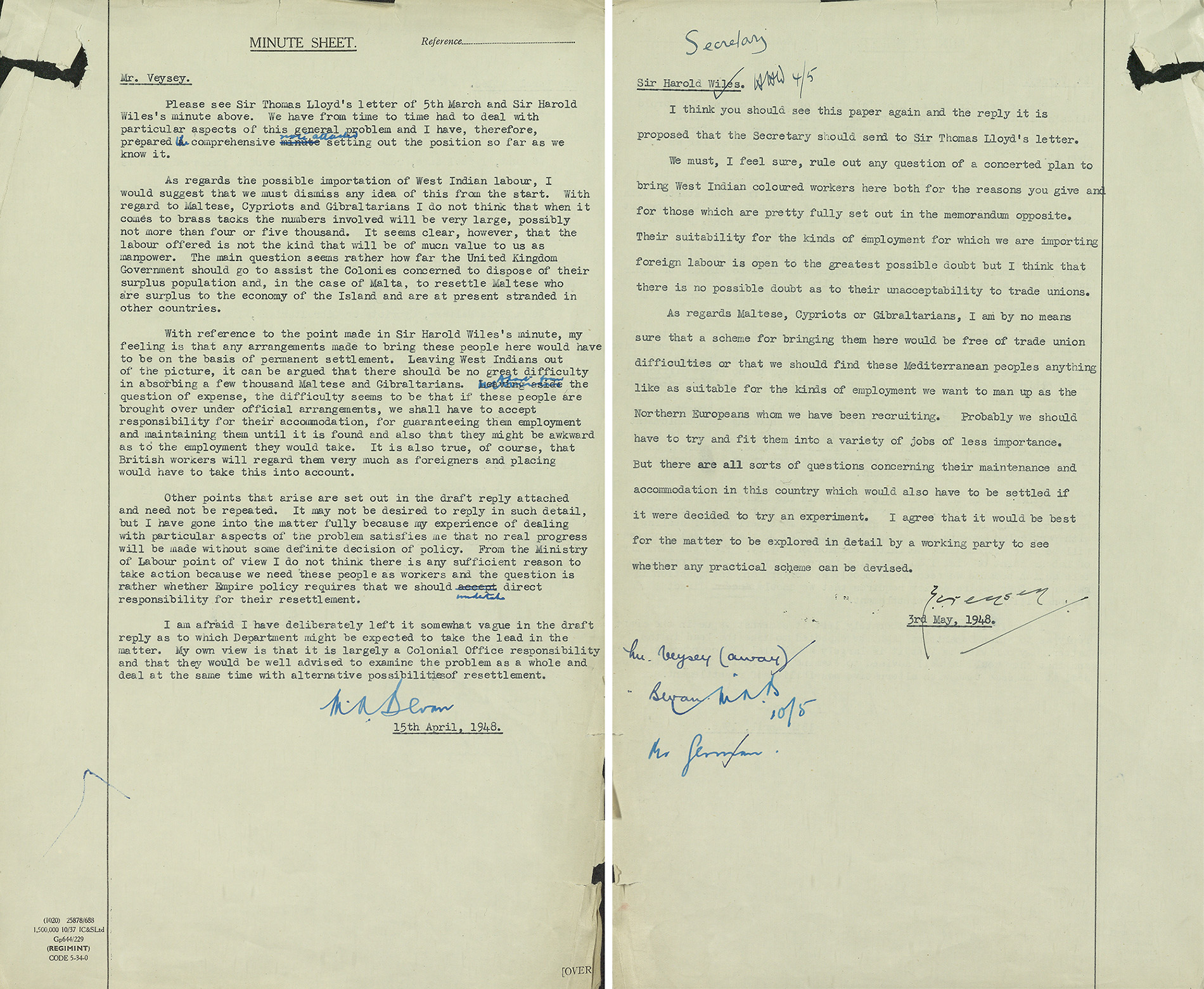
Two ‘minute papers’ dated 15 April and 3 May 1948, from a working party on the employment in the UK of surplus colonial labour. Catalogue ref: LAB 13/42
- What do these ‘minute papers’ reveal about the views of the Ministry of Labour on colonial migrant workers coming to Britain?
- What appears to be the view of trade unions?
- What is inferred about the government’s attitude towards Northern European migration to Britain?
- How can ‘minute papers’ be considered useful historical sources?
Transcript
(a)
Mr Veysey
Please see Sir Thomas Lloyd’s letter of 5th March and Sir Harold Wiles’ minute above. We have from time to time had to deal with particular aspects of this general problem and I have, therefore, prepared the comprehensive note attached setting out the position so far as we know it.
As regards the possible importation of West Indian labour, I would suggest that we must dismiss any idea of this from the start. With regard to Maltese, Cypriots and Gibraltarians I do not think that when it comes to brass tacks the numbers involved will be very large, possibly not more than four or five thousand. It seems clear, however, that the labour offered is not the kind that will be of much value to us as manpower. The main question seems rather how far the United Kingdom Government should go to assist the Colonies concerned to dispose of their surplus population and in the case of Malta, to resettle Maltese who are surplus to the economy of the Island and are at present stranded in other countries.
With reference to the point made in Sir Harold Wiles’s minute, my feeling is that any arrangements made to bring these people here would have to be on the basis of permanent settlement. Leaving West Indians out of the picture, it can be argued that there should be no great difficulty in absorbing a few thousand Maltese and Gibraltarians. Apart from the question of expense, the difficulty seems to be that if these people are brought over under official arrangements, we shall have to accept responsibility for their accommodation, for guaranteeing them employment and maintaining them until it is found and also that they might be awkward as to the employment they would take. It is also true, of course, that British workers will regard them very much as foreigners and placing would have to take this into account.
Other points that arise are set out in the draft reply attached and need not be repeated. It may not be desired to reply in such detail, but I have gone into the matter fully because my experience of dealing with particular aspects of the problem satisfies me that no real progress will be made without some definite decision of policy. From the Ministry of Labour point of view, I do not think there is any sufficient reason to take action because we need these people as workers and the question is rather Empire policy requires that we should undertake direct responsibility for their resettlement.
I am afraid I have deliberately left it somewhat vague in the draft reply as to which Department might be expected to take the lead in the matter. My own view is that it is largely a Colonial Office responsibility and that they would be well, advised to examine the problem as a whole and deal the same time with alternative possibilities of resettlement.
M.A. Bevan
15th April 1948
Transcript
(b)
Secretary
Sir Harold Wiles
I think you should see this paper again and the reply it proposed that the Secretary should sent to Sir Thomas Lloyd’s letter.
We must, I feel sure, rule out any question of a concerted plan to bring West Indian coloured workers here both for the reasons you give and those which are pretty fully set out in the memorandum opposite. Their suitability for the kinds of employment for which we are importing foreign labour is open to the greatest possible doubt, but I think that there is no possible doubt as to their unacceptability to trade unions.
As regards Maltese, Cypriots or Gibraltarians, I am by no means sure that a scheme for bringing them here would be free of trade union difficulties or that we should find these Mediterranean peoples anything like as suitable for the kinds of employment we want to man up as the Northern Europeans who we have been recruiting. Probably we should have to try and fit them into a variety of jobs of less importance. But there are all sorts of questions concerning their maintenance and accommodation in this country which would also have to be settled if it were decided to try an experiment. I agree it would be best for the matter to be explored in detail by a working party to see whether any practical scheme can be devised.
3rd May 1948
Mr. Veysey (away)
Bevan
Mr. German
